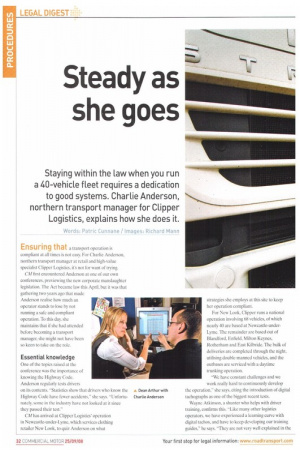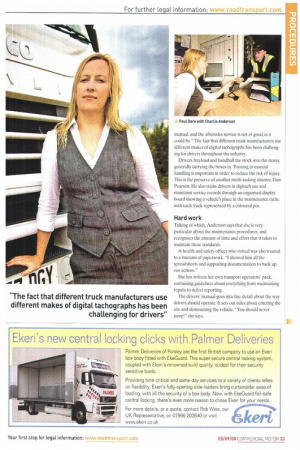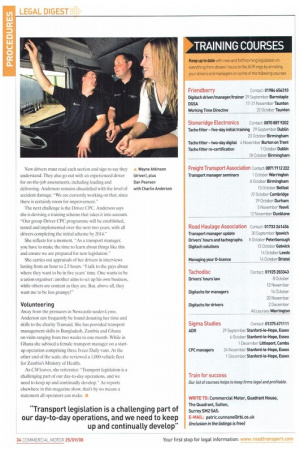Staying within the law when you run a 40-vehicle fleet
Page 32

Page 33

Page 34

If you've noticed an error in this article please click here to report it so we can fix it.
requires a dedication to good systems. Charlie Anderson, northern transport manager for Clipper Logistics, explains how she does it.
Words: Patric Cunnane / images: Richard Mann Ensuring that a transport operation is
compliant at all times is not easy. For Charlie Anderson, northern transport manager at retail and high-value specialist Clipper Logistics, it's not for want of trying.
CM first encountered Anderson at one of our own conferences, previewing the new corporate manslaughter legislation. The Act became law this April, but it was that gathering two years ago that made Anderson realise how much an operator stands to lose by not running a safe and compliant operation. To this day, she maintains that if she had attended before becoming a transport manager, she might not have been so keen to take on the role.
Essential knowledge
One of the topics raised at the conference was the importance of knowing the Highway Code. Anderson regularly tests drivers
on its contents. 'Statistics show that drivers who know the . Dean Arthur with Highway Code have fewer accidents," she says. "UnfortuCharlie Anderson
nately, some in the industry have not looked at it since they passed their test."
CM has arrived at Clipper Logistics' operation
in Newcastle-under-Lyme, which services clothing retailer New Look, to quiz Anderson on what strategies she employs at this site to keep her operation compliant.
For New Look, Clipper runs a national operation involving 68 vehicles, of which nearly 40 are based at Newcastle-underLyme. The remainder are based out of Blandford, Enfield, Milton Keynes, Rotherham and East Kilbride. The bulk of deliveries are completed through the night, utilising double-manned vehicles, and the outbases are serviced with a daytime trun king operation.
"We have constant challenges and we work really hard to continuously develop the operation," she says, citing the introduction of digital tachographs as one of the biggest recent tests.
Wayne Atkinson, a shunter who helps with driver training, confirms this. -Like many other logistics operators, we have experienced a learning curve with digital tachos, and have to keep developing our training guides," he says. "They are not very well explained in the manual, and the aftersales service is not as good as it could be." The fact that different truck manufacturers use different makes of digital tachographs has been challenging for drivers throughout the industry.
Drivers freeload and handball the stock into the stores, generally carrying the boxes in. Training in manual handling is important in order to reduce the risk of injury. This is the preserve of another multi-tasking shunter, Dan Pearson. He also trains drivers in digitach use and maintains service records through an organised display board showing a vehicle's place in the maintenance cycle, with each truck represented by a coloured pin.
Hard work
Talking of which. Anderson says that she is very particular about the maintenance procedures, and recognises the amount of time and effort that it takes to maintain these standards.
A health and safety officer who visited was also treated to a tsunami of paperwork. "I showed him all the spreadsheets and supporting documentation to back up our actions."
She has written her own transport operators' pack, containing guidelines about everything from maintaining repute to defect reporting.
The drivers' manual goes into fine detail about the way drivers should operate. It sets out rules about entering the site and clemounting the vehicle. "You should never jump!" she says. New drivers must read each section and sign to say they At Wayne Atkinson understand. They also go out with an experienced driver (driver), plus for on-the-job assessments, including loading and Dan Pearson delivering. Anderson remains dissatisfied with the level of with Charlie Anderson
accident damage. "We are currently working on that, since there is certainly room for improvement."
The next challenge is the Driver CPC. Anderson says she is devising a training scheme that takes it into account.
"Our group Driver CPC programme will be established, tested and implemented over the next two years, with all drivers completing the initial scheme by 2014."
She reflects for a moment, "As a transport manager, you have to make the time to learn about things like this and ensure we are prepared for new legislation."
She carries out appraisals of her drivers in interviews
lasting from an hour to 2.5 hours. "I talk to the guys about
where they want to be in Eve years' time. One wants to be a union organiser; another aims to set up his own business, while others are content as they are. But, above all, they want me to be less grumpy!"
Volunteering Away from the pressures in Newcastle-under-Lyme, Anderson can frequently be found donating her time and skills to the charity Transaid. She has provided transport management skills in Bangladesh, Zambia and Ghana on visits ranging from two weeks to one month. While in Ghana she advised a female transport manager on a startup operation comprising three Iveco Daily vans. At the other end of the scale, she reviewed a 1,000-vehicle fleet for Zambia's Ministry of Health.
As CM leaves, she reiterates: "Transport legislation is a challenging part of our day-to-day operations, and we need to keep up and continually develop." As reports elsewhere in this magazine show, that's by no means a statement all operators can make. is




































































































































































